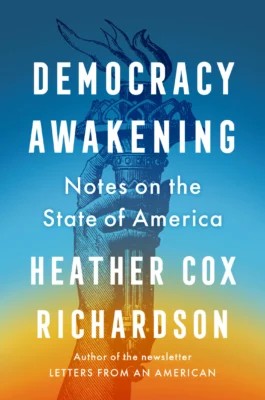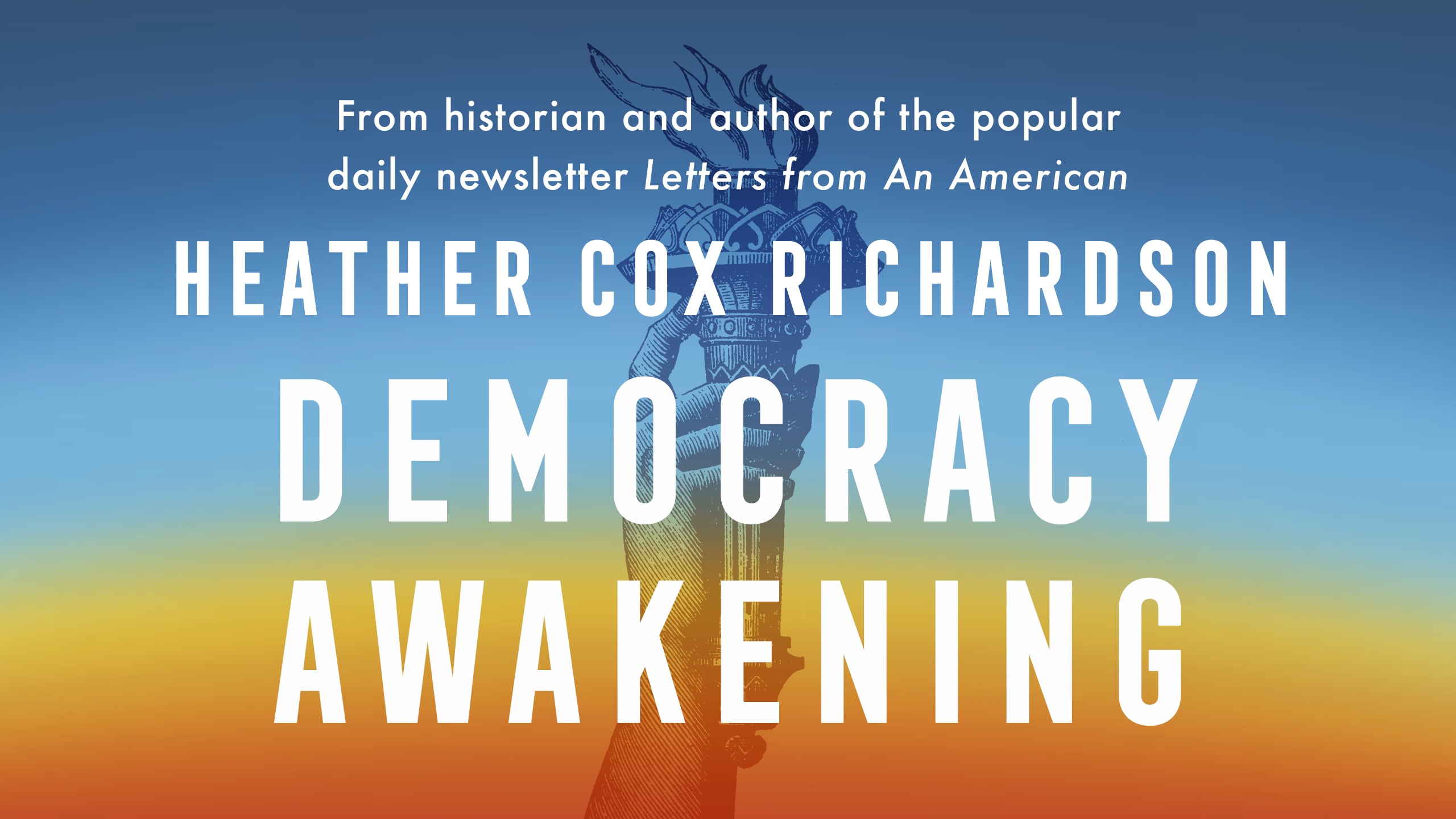How, author and historian Heather Cox Richardson asks, did we get where we are now, with millions of Americans fearing democracy and socialism as fundamental threats to the world’s biggest republic, and an equal if not larger number convinced the danger lies in the appeal of authoritarianism?
The answer, Richardson writes in Democracy Awakening: Notes on the State of America, is to be found in what Americans have been taught about this nation’s history. According to Democracy Awakening, there are two principal understandings of our nation’s origins and subsequent development: the “authoritarian” and the “democratic.” Which of these we accept as true largely determines our reactions to current events today.
Richardson approaches her subject from a progressive perspective. The key to the rise of authoritarianism in the United States, she writes, lies in the “use of language and false history”; a “strongman warps history to galvanize his base.” “This is a book,” Richardson continues, “about how a small group of people have tried to make us believe our fundamental principles aren’t true.”
She states that the fall of democracy and the rise of authoritarianism in the United States today rests on a mistaken history of the United States. According to Democracy Awakening, historical ideas play a major causative role in explaining the rise of Donald Trump and all his movement represents.
These two competing origin histories of the United States, according to Richardson, derive their fundamental principles from different founding documents.
The “democratic” view of American history rests on the principles stated in the Declaration of Independence. This nation was created, the Declaration proclaims, to “dissolve political bands” with the King of England’s tyrannical government, a government that taxed the colonists without allowing them representation.
Richardson emphasizes, as well, the Declaration’s inclusive language: the “self-evident truths” that “…all men are created equal, they are endowed by their Creator with certain unalienable Rights, that among these are Life, Liberty and the pursuit of Happiness ….” This, according to the “democratic” origin history, has always been the fundamental nature and purpose of the United States, no matter how imperfectly carried out over the centuries.
According to the “democratic” origin history, then, the principal reasons for the Revolutionary War and the creation of the United States as a nation were, first, to secure the rights of individuals, and second, to protect them from tyranny. The government’s authority is derived from the consent of the governed.
In contrast, the “authoritarian” explanation for why the United States was created rests not the Declaration of Independence, but the United States Constitution.
This argument begins with an explanation of why the Constitutional Convention of 1787 was called. The first national government for the new United States was the Articles of Confederation (1781). Reacting to the “tyranny” of the British government, the national government under the Articles was purposely granted limited powers. It proved too weak, however, to be effective.
Shays’ Rebellion (1786), an armed, violent uprising of outraged farmers in Massachusetts, raised concerns among powerful and wealthy patriot leaders throughout the newly independent United States.
They feared anarchy and the break-down of public order; the weak central government under the Articles was unable to cope with this danger.

Citing this history, Richardson sees the United States Constitution as an “authoritarian” document. It was created out of fear of riots, rebellion, mobs, and masses by those in positions of power. This “origin story” understands the original purpose of government in the United States to be protection from the mass will – from the “mass” of people in general.
Democracy Awakening discusses in some detail provisions of the original Constitution designed to ensure power remained with elites, rather than the majority of the people.
For example, the Framers gave the Electoral College the responsibility of choosing the President, instead of having the position chosen by popular vote.
For the upper chamber of Congress (the Senate), each state, whatever its population of physical size, was granted two Senators.
For the lower House, districts for each House member were to be of roughly equal size. This limited the representation of cities, with their larger, more concentrated populations. Richardson also emphasizes that the Constitution recognized and codified slavery, and the “inferiority” of Blacks (especially after the infamous Dred Scott Supreme Court decision of 1857).
The “authoritarian” view of the origins of the United Sates (according to Democracy Awakening) is that the United States always has been authoritarian, elitist, classist, and racist. Shortly after independence, a government strong enough to maintain stability and order was instituted.
Most of the text of Democracy Awakening is devoted to a broad history of the United States from the Revolution through the rise of Donald Trump and the attack on the Capitol in January 2021. It is a readable history, consistently oriented to elaborating events, movements, and ideas that forwarded either the “authoritarian” or the “democratic” story of the nation’s true purpose and origins.
For those familiar with Heather Cox Richardson’s other writings, or, more generally, with the overall traditional textbook accounts of the United States, there is little in Democracy Awakening that is new.
On the other hand, if Professor Richardson’s perspectives are novel to you, reading Democracy Awakening could be revealing. Her well-developed historical generalizations offer striking perspectives on the history of the United States.
Historical generalizations may open our eyes to new ways of viewing our past. This, in turn, may clarify what is happening in our own lives.
That is the primary intention of Democracy Awakening.
In the final analysis, however, the value of historical generalizations must rest on the extent to which they are accurate historically.
All large-scale generalizations have exceptions; the world is too complex (as are each of us) to expect otherwise. The question is: Are the exceptions sufficient to invalidate the usefulness of the generalizations?
The exceptions to the overall thesis of Democracy Awakening are numerous.
For example, the Declaration of Independence does declare “all men” are created equal and therefore enjoy certain inalienable rights. In the late eighteenth century, however, those words carried a different meaning than they do today.
The authors of the Declaration assumed as obvious that most of the population was not included under the rubric “all men.”
The most prominent author of the Declaration, Thomas Jefferson, was a slaveholder who believed firmly that Blacks were inherently inferior.
In addition, women — all women, poor and wealthy, white or Black — Native Americans, tradespeople, and certain religious groups were all excluded in the authors’ minds. (Richardson is certainly aware of this reality; in later chapters of Democracy Awakening, she discusses it in some detail.)
In the 20th century, Teddy Roosevelt, and the Progressive Movement, and Franklin Delano Roosevelt, and the New Deal, are described as prime examples of the expansion of the national government’s democratic responsibilities. Antitrust legislation under Teddy, Social Security, and support for Labor in the New Deal. are included as examples.
However, it’s also important to note — and historically accurate — that both Presidents Teddy Roosevelt and Franklin D. Roosevelt held racist view. The New Deal often excluded Blacks from its programs; FDR’s administration also refused entry to the United States to Jewish refugees during World War II. (The United States armed forces were not desegregated until after World War II.)
Another noteworthy example of our nation’s nuanced history is the right wing Republican President Richard Nixon. Nixon and his staff were pioneers in developing a racist “southern strategy” to persuade Democratic, white voters to vote Republican. His campaign utilized racist tropes extensively.
However, Nixon, this exemplar of the “authoritarian,” elitist, racist view of our country’s identity, went further than any other president, before or since, in his advocacy for a government run national medical service – a hated system often described as “socialism” by its conservative opponents today.
Heather Cox Richardson is certainly aware of these (and many other) complexities and contradictions in our nation’s history. However, Democracy Awakening does not deem them sufficient to invalidate its historical generalizations.
Broad generalizations may open our eyes to new ways of viewing the nation’s past. This, in turn, may clarify what is happening in our own lives. That is the primary intention of Democracy Awakening. In the final analysis, however, as noted above, the usefulness of historical generalizations must rest on the extent to which they are accurate historically. I encourage readers of Democracy Awakening to note its subtitle, Notes on the State of America.

